Being unpopular is all the rage.
With Fan Expo Canada running Aug 28 to 31 at the Metro Convention Centre, Toronto will be flooded with nerds and geeks from all walks of life, including many from the LGBT community. Xtra spoke with Hope Nicholson, Lost Heroes’ associate producer and CGA Comics co-founder; Geeks OUT’s Jono Jarrett; and Toronto Gaymers’ Samson Romero about gay geek representation and the rise of nerd culture.
Xtra: Why do you think that there is significant overlap between the LGBT community and nerd/geek communities?
Jono Jarrett: I’m just one person, but I think there are lots of opportunities for overlap. Not to generalize too broadly, but if you’re growing up as a creative little queerling and don’t necessarily fit in with the rest of the kids, nerdier pursuits like comic books or video games or horror movies or music could be a necessary escape and the best way to make friends with other outcasts. I think, too, when one comes out as queer and learns to live that truth, sometimes in the face of societal or familial pressure, it’s easy not only to “come out” as a geek, but to embrace and celebrate that “otherness.” Plus, cosplay — I mean, come on.
Hope Nicholson: I think that geek culture is all about opening doors to other worlds. It gives you the ability to imagine a world like Superman’s, where you have all the strength, power and wisdom that you would ever need, and a world that would support you for standing up for what’s right. At the same time, some media mirror the actual experience and not the fantasy of gay people, such as X-Men, where their power isn’t respected and admired, but feared and hated. It’s a broad spectrum of imagination.
Gay geek culture seems to be more prevalent these days. Why do you think that is?
JJ: Nothing’s hotter than being a geek, right? Revenge of the nerds, indeed. I’ve always loved this stuff, so I’m not sure whether it’s that times are tough these days so the escapism of sci-fi and fantasy are especially attractive, or if endurance and quality have finally turned “genre fiction” and pop culture into accessible, relevant, respectable modern art. Or both? It’s fun; don’t we all want to have a little fun?
HN: I think that geek culture is really starting to become more of a community that is vocal about their presence, so whether the gay geek community is getting stronger or whether it’s just becoming more visible, I can’t say. I suspect the latter.
Do you have a sense of what LGBT presence will be like at Fan Expo this year?
Samson Romero: Fan Expo usually has a panel/meet-up on one day for LGBTQ people. In the past, George Takei was a guest, and that was amazing. There are some LGBTQ artists in the artist alley, but this year, Toronto Gaymers will have a table in room 718. It is our first [time at the convention] and we are excited to be part of Fan Expo . . . and to see Matt Smith and his companions.
HN: Well, I’ll be there, promoting different comic-book projects at booth A212: Canuck Comics. There are always some great indie queer comics in the artist’s alley if you go and browse around. In terms of celebrities, a lot of the queer-friendly Canadian sci-fi series Lost Girl will be there.
Tell me a bit about your experiences on the convention circuit. Do you feel that the LGBT community is well represented?
JJ: I think there’s still an element of surprise, for queer folk who are there as fans that [members of Geeks OUT] actively identify as both queer and geek and try to empower others to do so . . . The truth is, one subculture doesn’t always embrace another. The mentality of bullying is to prey on the weak, and both the bullied and the bullies learn that lesson. Sometimes we turn on each other. [Our organization] seeks to loosen that knot so that everyone can have fun, and convention-goers of all types really respond to our message. That can be intimidating at first, but it’s always proven rewarding.
Can you speak to any other organizations that gay geeks can seek out?
SR: We know that Gaymer Zone (Montreal) and the Vancouver Gaymers are other LGBTQ gaming groups in Canada. Also, other cities around the world have their own groups.
JJ: Geeks OUT started in New York, but we have awesome satellite chapters opening in other cities. If a group of friends wants to join up with like-minded dorks, we’re all for it. Ground-level groups like ours must exist all over. Check around on Facebook; your local comic shop or game store may have a community board or flyers for meet-ups.
HN: Well, there’s the Gay League [Facebook page] . . . Comics Alliance is a comics website that features queer commentary quite regularly, as does The Mary Sue, so both are recommended in that respect. There’s the Toronto Gaymers, too, and a strong nerd burlesque community in Toronto that features queer content regularly. I also recommend checking out The Beguiling for tips on comic books with queer representation, if you’re not into superheroes but do love the comic-book format.
Fan Expo runs until Sun, Aug 31 at the Metro Toronto Convention Centre, 255 Front St W
While Geeks OUT won’t be at Fan Expo this year, you can get more info on the organization at geeksout.org. Toronto Gaymers and Hope Nicholson will be there, and you can learn more about both at torontogaymers.ca/wordpress and nelvanacomics.com.

 Why you can trust Xtra
Why you can trust Xtra


